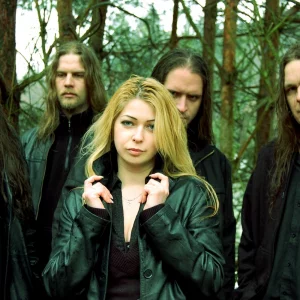History Dalriada
1. The hungarian Dalriada www.dalriada.hu
Dalriada was formed in Sopron, Hungary in February 2003 with the intention of combining metal and Hungarian folk music, thus fostering the incredibly rich heritage of Hungarian folk art. Due to other influences some elements of death and gothic metal are also present.
The word „Dalriada” can be familiar to many people. It’s a historical name, the name of the first kingdom of the Scots, but based on some linguistic studies it may have an ancient Hungarian origin with the meaning of “battle-song”. From 2003 until the end 2006 the name of the band was “Echo Of Dalriada” in order emphasize the Hungarian meaning, but at the beginning of 2007 the name was simplified to “Dalriada” to have a shorter name without English words in it.
The genre of Dalriada’s music is folk metal, since Hungarian folk elements, folk song extracts and even some Hungarian folk-song covers are included in the repertoire of the band. Nonetheless, the music is fundamentally described as metal, with influences ranging from heavy to gothic or death.
The lyrics are mostly sung in Hungarian and almost entirely self-made, with the exception of those taken from folk songs and from the works of a famous Hungarian poet - Janos Arany.
Albums and Demos:
- A Walesi Bárdok (The Bards of Wales) - 2003 [demo]
- Fergeteg (Storm) - 2004
- Jégbontó (Ice Destroyer) - 2006
- Kikelet (Springtime) - 2007
- Szelek (Winds) - 2008
- Arany- album - 2009
- Ígéret (Promise) - 2011
Members:
Laura Binder - vocals, flute, violin
András Ficzek - guitar, vocals
Mátyás Németh Szabó - guitar
István Molnár - bass
Tadeusz Rieckmann - drums
Barnabás Ungár - keyboards
Former members:
András Kurz - keyboards
György Varga - bass
Marcell Fispán - guitar
Gergely Nagy - keyboards
2. The australian Dalriada (http://www.dalriada.com.au)
3. Also an early-90s Scottish folk-rock band who released one album All is Fair in 1991, of Scottish folk classics.
Creative Commons By-SA License
 FM
FM

